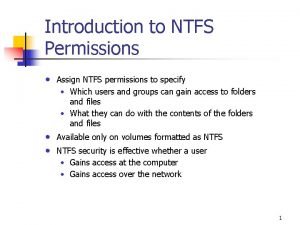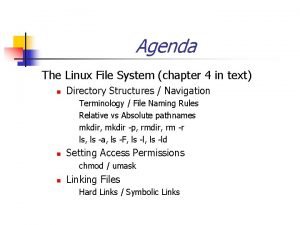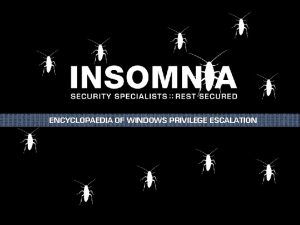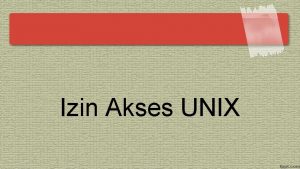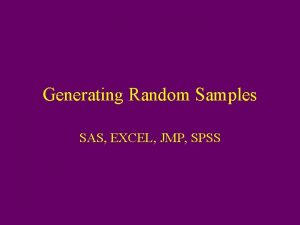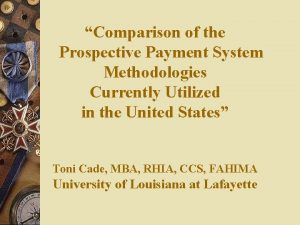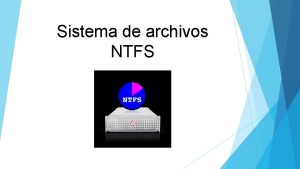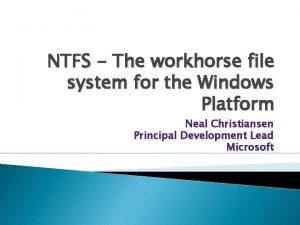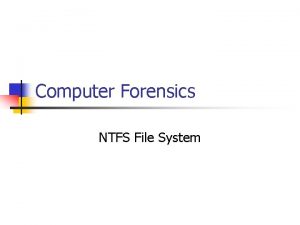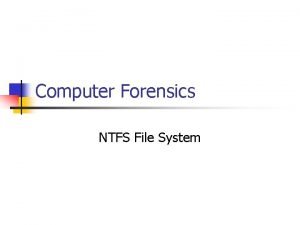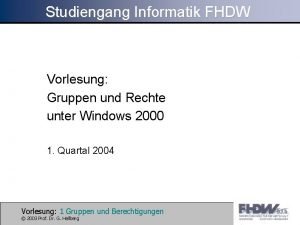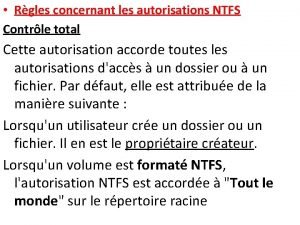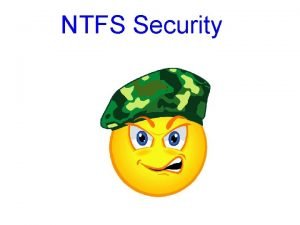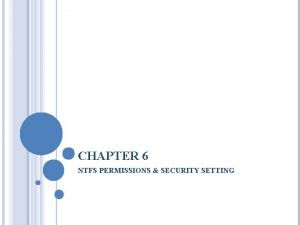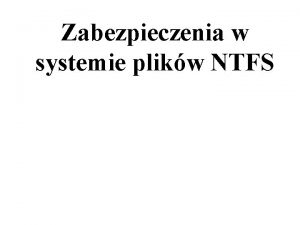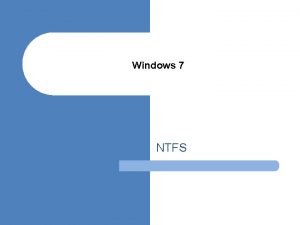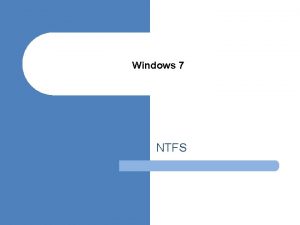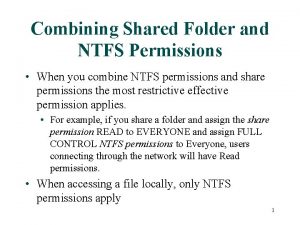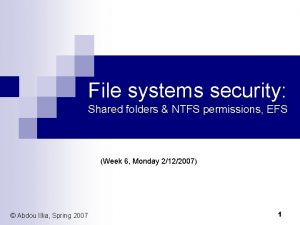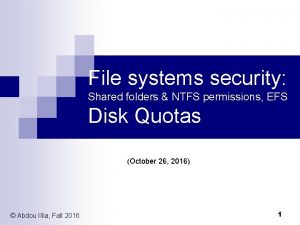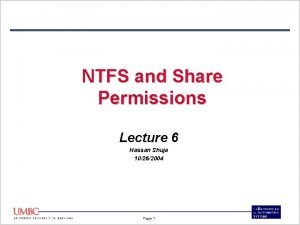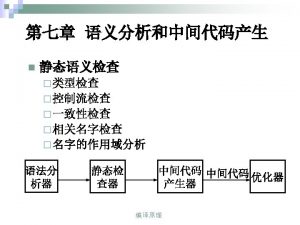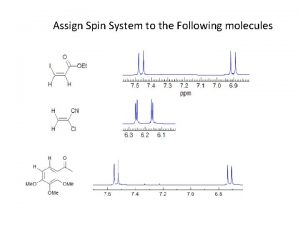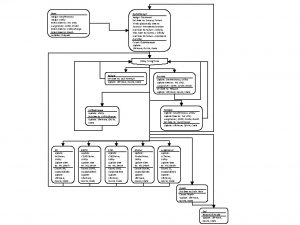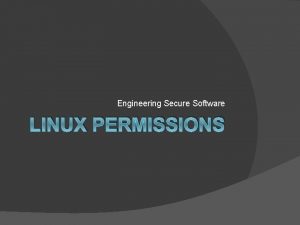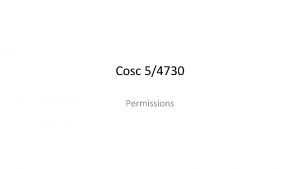Introduction to NTFS Permissions Assign NTFS permissions to





















- Slides: 21

Introduction to NTFS Permissions • Assign NTFS permissions to specify • Which users and groups can gain access to folders and files • What they can do with the contents of the folders and files • • Available only on volumes formatted as NTFS security is effective whether a user • Gains access at the computer • Gains access over the network 1

NTFS Folder Permissions • • • Read Write List Folder Contents Read & Execute Modify Full Control 2

NTFS File Permissions • • • Read Write Read & Execute Modify Full Control 3

Who Can Apply NTFS Permissions? • • • Administrators Owners of files and folders Users with Full Control permission 4

Access Control List (ACL) • • NTFS stores an ACL with every file and folder. ACL contains • A list of all user accounts and groups granted access. • The type of access each user and group has been granted. • An access control entry (ACE) for a user account or a group. 5

Multiple NTFS Permissions 6

NTFS Permissions Inheritance 7

Planning NTFS Permissions Slide 1 • Simplify administration. • Organize files into groups. • Keep home and public folders on a separate volume from the operating system and applications. • • Allow only the level of access required. Create groups according to the access requirements. 8

Planning NTFS Permissions Slide 2 • For working with data or application folders • Assign Read & Execute permission to the Users group. • Assign Read & Execute permission to the Administrators group. • For working with public data folders • Assign Read & Execute and Write permissions to the Users group. • Assign the Full Control permission to the CREATOR OWNER user. 9

Planning NTFS Permissions Slide 3 • • Deny permissions only when it is essential. Encourage users to assign permissions to their files and folders. 10

Setting NTFS Permissions • When you format a volume with NTFS, the Full Control permission is assigned to the Everyone group. • Change this default permission and assign appropriate permissions. 11

Assigning or Modifying NTFS Permissions 12

Preventing Permissions Inheritance • • By default, subfolders and files inherit permissions. Clear the Allow Inheritable Permissions From Parent To Propagate To This Object check box, which will prompt you to select an option: • Copy. • Remove. • Cancel. 13

Special Access Permissions • • There are 14 special access permissions. The Change Permissions special access permissions is one of the most frequently used. When you assign users the Change Permissions special access permission, you give them • The ability to change permissions. • You don’t have to assign them the Full Control permission. • You don’t give them the ability to delete or write to the file or folder. 14

Taking Ownership • Current owner or a user with Full Control permission • Assigns a user the Full Control permission. • Assigns a user Take Ownership permission. • • • User can now take ownership of a file or folder. An administrator can take ownership of a file or folder. You cannot assign anyone ownership of a file or folder. 15

Setting Special Access Permissions 16

Taking Ownership of a File or Folder • • Select your name in the Change Owner To list. Select the Replace Owner On Subcontainers And Objects check box. 17

Copying Files and Folders • • Causes permissions to change • Requires you to have Write permission for the destination folder • • Makes you the CREATOR OWNER of the new file or folder Assigns the new file or folder the destination folder’s permissions Loses all NTFS permissions when you copy them to a FAT volume 18

Moving Files or Folders Within a Single NTFS Volume • • Retains the original permissions • Requires you to have Modify permission for the source file or folder • Retains the original owner of the file or folder Requires you to have Write permission for the destination folder 19

Moving Files or Folders Between NTFS Volumes • Causes the file or folder to inherit the permissions of the destination folder • Requires you to have Write permission for the destination folder • Requires you to have Modify permission for the source file or folder • Causes you to become the CREATOR OWNER of the file or folder • Loses all NTFS permissions when you move them to a FAT volume 20

Solving Permissions Problems • • A user can’t gain access to a file or folder. • A user with Full Control permission to a folder deletes a file in the folder, but that user doesn’t have permission to delete the file itself. You add a user account to a group to give the user access to a file or folder, but the user still can’t gain access. 21
 Ntfs permissions
Ntfs permissions Pass through permissions linux
Pass through permissions linux Upnphost privilege escalation
Upnphost privilege escalation Security permissions in smartview for dynamics gp
Security permissions in smartview for dynamics gp Ls command permissions
Ls command permissions Adrienne porter felt
Adrienne porter felt Did investigator assign exposures
Did investigator assign exposures Ascom unite assign
Ascom unite assign Incdir verilog
Incdir verilog Ge ascom secondary alarm notification solution
Ge ascom secondary alarm notification solution Lc cutter table
Lc cutter table Web assign
Web assign Sas random number
Sas random number Verilog assign 조건문
Verilog assign 조건문 A computer software program that assign appropriate ms-drgs
A computer software program that assign appropriate ms-drgs Que es nfts
Que es nfts Windows 7 ntfs
Windows 7 ntfs Ntfs architecture
Ntfs architecture Mft record structure
Mft record structure Ntfs berechtigungen dokumentieren
Ntfs berechtigungen dokumentieren Autorisation ntfs
Autorisation ntfs Ntfs
Ntfs
